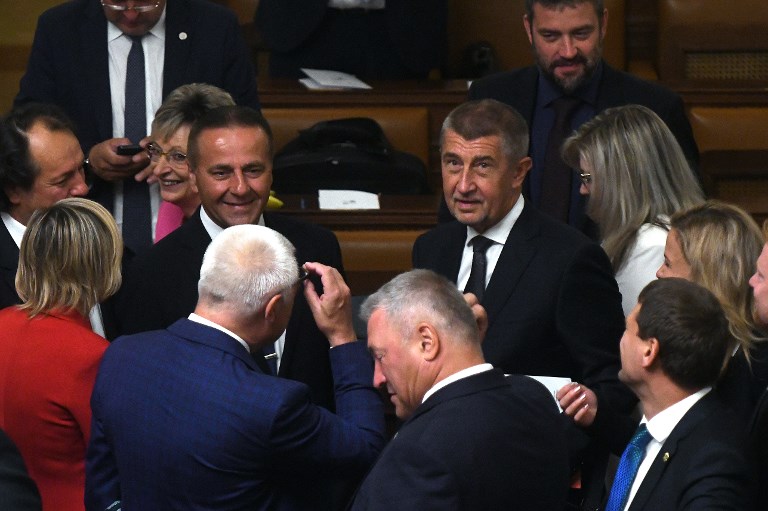
by Jan Flemr
Agence France-Presse
PRAGUE, Czech Republic (AFP) — The minority government of billionaire Czech Prime Minister Andrej Babis won a parliamentary confidence vote Thursday, becoming the first administration since the 1989 collapse of communism to rely on backing from the Communist Party.
It took Babis nine months to form a government after he won last October’s election, with potential partners initially shunning him over allegations of EU subsidy fraud among other concerns.
He finally struck a minority coalition deal with the Social Democrats in June, but with just 93 seats they must rely on backing from the Communist Party, which controls 15 seats.
“The parliament has voiced confidence in the cabinet,” parliament speaker Radek Vondracek said early Thursday morning after a marathon session lasting more than 16 hours.
A total of 105 lawmakers out of 196 present in the 200-seat parliament voted in favour of Babis’s minority cabinet, while 91 were against.
The staunchly pro-Russian and anti-NATO Communists pledged to back Babis in exchange for positions in state-owned enterprises, giving them a role in government, albeit an informal one, for the first time since the Communist regime fell in the former Czechoslovakia.
“This situation is brand new, it’s a shift,” Tomas Lebeda, a political analyst from Palacky University in the eastern city of Olomouc, told AFP.
“But it’s not a revolution. The Communists have experience with such support and even governing on the regional and municipal level,” he added.
Several hundred protesters gathered outside parliament on Wednesday to protest against the Communist Party, echoing larger protests across the EU country in June.
When Babis walked out to meet the protesters, he was booed back into the parliament building. Media said some protesters threw plastic bottles at him.
Lebeda said he expected the cabinet to enjoy “basic stability for some time”.
“But a minority cabinet is always less stable, and this is also a coalition cabinet. Its stability won’t be too great,” he added.
Murky past
Babis’s populist ANO (YES) movement won the October vote campaigning on an anti-corruption ticket, but the tycoon has struggled to put together a viable coalition because of his murky past.
A Communist Party member in the 1980s, Babis has denied allegations that he served as a regime secret police agent before 1989.
A Slovak-born food, chemicals and media tycoon and the second wealthiest Czech, Babis is also indicted with EU subsidy fraud to the tune of two million euros ($2.4 million). He has denied any wrongdoing.
Babis’s first attempt to form a government failed in January when his minority government of ANO members and unaffiliated experts lost a confidence vote.
President Milos Zeman gave him a second chance in June after ANO clinched a minority coalition deal with the Social Democrats, with whom they governed as a junior partner from 2013 to 2017.
Anti-migrant
The cabinet is incomplete as Zeman refused to name Social Democrat Miroslav Poche foreign minister, with the job temporarily taken by party chairman and Interior Minister Jan Hamacek.
The pro-Russian, pro-Chinese and anti-Muslim Zeman, who is also a former Communist, has slammed Poche over allegations of corruption and his tolerant stance on migrants.
Babis has vowed to fight illegal migration, a hot issue for the 10.6 million people in the republic, although very few asylum seekers made it to the country in the wake of Europe’s 2015 migrant crisis.
The Czech Republic was among four hardline anti-migrant eastern EU states that crowed victory last month over a controversial deal dropping the EU’s mandatory quota system in favour of measures designed to stem the influx of asylum seekers.








